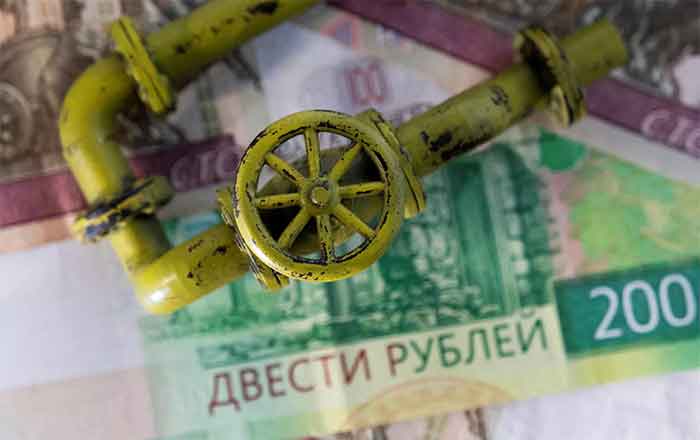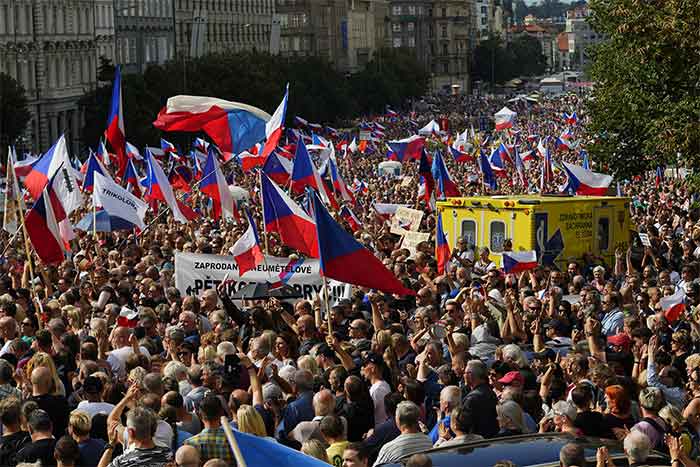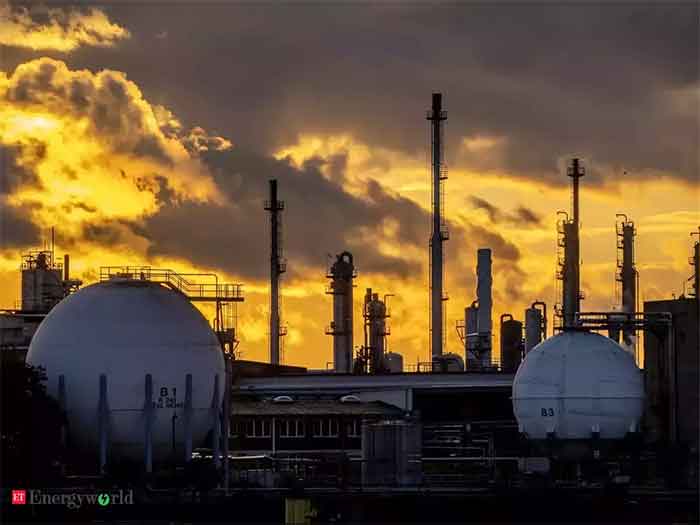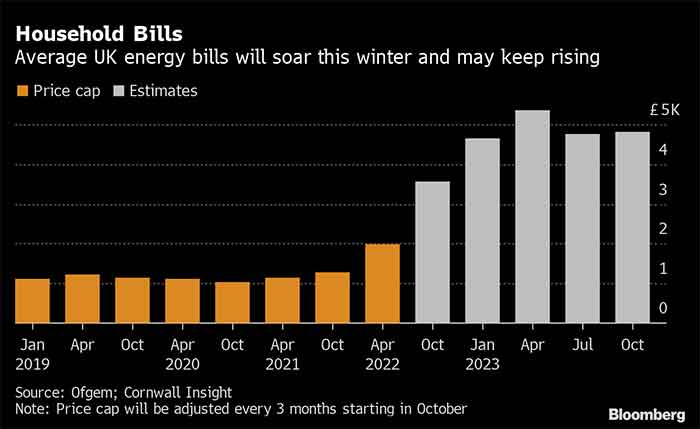
Europe is in energy turmoil with uncertainty in the coming winter and measures to counter Russia. The EU finds consensus is elusive and solidarity is in short supply.
A Bloomberg report said:
European ministers sounded defiant as they met in Brussels to deliberate plans aimed at halting the spiral in energy prices.
“We will prevail,” European Union Energy Commissioner Kadri Simson told reporters, even with “a difficult winter ahead of us.”
The Bloomberg report said:
In reality, defiance may soon give way to desperation.
Friday’s meeting in Brussels capped a frenzied week of government activity across the 27-nation bloc in which it became clear just how complex it is to forge a common response to the energy crisis given the breadth of challenges.
The refrain was that the clock is ticking for action. That is even more the case after Russia upped the ante just over a week ago, when Gazprom PJSC cut off gas deliveries to Europe via the Nord Stream pipeline indefinitely.
That sparked another round of budget-straining measures as governments announced additional aid to help people pay their bills. They were also forced to deal with a new financial threat from the crisis. As soaring energy prices leave some businesses struggling to find enough cash to meet margin calls, countries announced billions of euros in liquidity funding.
At the EU gathering, consensus remained elusive and solidarity in short supply as ministers sought to agree on measures to support citizens and businesses without wrecking the entire energy market.
Tensions bristled over proposed mandatory cuts in power demand and German calls for a mechanism to share any excess supply. Plans for a price cap on Russian gas were met with skepticism and a cap on all imported gas discussed instead. But it is unclear how lower prices could be implemented.
The discord among European leaders was amplified by a growing sense of anxiety over the economic and political fallout from the crisis.
Political System Under Threat
In the Czech Republic, which holds the EU’s rotating presidency, the justice minister warned that the political system was under threat.
Specter of Mass Unemployment
In Hungary, Cabinet Minister Gergely Gulyas raised the specter of mass unemployment if key industrial companies are forced to suspend production or shutter altogether, creating a domino effect.
Yellow Vest Haunts France
The biggest concern in France is of a potential new chapter similar to the Gilets Jaunes, or Yellow Vest movement, which will haunt any government for the next two decades, according to a person familiar with the thinking in President Emmanuel Macron’s administration.
Anything related to purchasing power is highly sensitive in France, and it simply cannot afford to be in a situation like the UK or Belgium, where energy bills have doubled or tripled, said the person, adding that the government will continue to do all it can to avert such a scenario.
The energy crisis has been building and building since before Russian President Vladimir Putin invaded Ukraine early this year, prompting successive rounds of international sanctions and an EU decision to phase out its dependence on Russian coal, oil and, most difficult of all, natural gas.
20 Hours Negotiation
After Nord Stream was cut off, German Chancellor Olaf Scholz convened his cabinet early Saturday to piece together a third relief package for households and companies. The negotiations with coalition allies lasted almost 20 hours until the early hours of Sunday, when they emerged with aid measures worth 65 billion euros, including higher subsidies for lower-income households and cash payments to students and pensioners.
Scholz also decided to throw Germany’s weight behind EU efforts to put a levy on so-called “windfall profits” of utilities as surging earnings fuel public outrage.
Germany, he said, has a good chance to get through this winter “by the skin of its teeth.” A poll later found that voters don’t share that optimism, saying the measures are not enough.
Drag On GDP
According to Bloomberg Economics, Russia’s decision to completely halt gas flows through Nord Stream will raise the euro area’s gas bill by an extra 50 billion euros. That is on top of a 460 billion-euro hit from earlier price increases.
Heading To Recession
All told, the squeeze will exert a drag on GDP of about 2.2% annually, rising to as high as 4% if the winter is unusually cold and there is a breakdown in European unity. Even with the government support, the economy is still heading for a recession at the end of the year, say economists Maeva Cousin, Jamie Rush and Martin Ademmer.
Progress is being made. Before the invasion, Europe relied on Russia for 40% of its gas imports; now pipeline flows only account for 9%, European Commission President Ursula von der Leyen said this week. Record imports of liquefied natural gas from Norway, the US and Qatar have helped offset the gap, while LNG infrastructure is rapidly being set up.
Risk Of Social Upheaval
But it cannot come soon enough. The talk in Brussels is of the risk of social upheaval. National governments have already earmarked billions of euros, and the energy crunch may run for years.
“Burn almost everything,” Poland’s de facto leader, Jaroslaw Kaczynski, told a meeting with voters last weekend, adding that the country needs to “stay warm.”
In one small bit of good news, gas prices declined this week, extending their drop from August records. But they are still eight times higher than normal for the time of year, and extremely volatile. These wild movements are causing huge liquidity problems for utilities as they are asked to put up cash to guarantee their trades.
Sweden And Norway
On Sunday, Sweden and Finland announced a $33 billion emergency liquidity facility to help struggling utilities and stave off what Finnish Economy Minister Mika Lintila dramatically called “the ingredients for an energy-industry Lehman Brothers” moment.
It was start of a cascade of government measures. On Tuesday, Finnish utility Fortum Oyj got 2.35 billion euros of bridge funding to ensure adequate liquidity. Switzerland granted Axpo a credit line of up to 4 billion francs ($4.2 billion).
UK
Thursday saw the UK Treasury and Bank of England launch a 40 billion-pound ($46 billion) fund for energy traders to help provide market stability.
Von der Leyen’s Credibility
The situation in energy markets has been on the agenda of every meeting of EU leaders in the past several weeks. Von der Leyen brought forward the outline of the commission’s emergency plan, but the detail will have to wait for her annual State of the Union speech on Sept. 14.
Her credibility depends on success. For Europe, though, it is existential.
“A few weeks like this and the European economy will just go into a full stop,” Belgian Prime Minister Alexander De Croo said.
EU Drops Plan To Cap Russian Gas Prices
A Reuters report said:
Energy ministers from the bloc met Friday (September 9) in Brussels. They scrapped plans for the cap after the idea failed to win broad support.
However, ministers did agree to claw back revenues from some power producers, and will use the money to curb consumer bills.
European energy prices are typically set by gas plants.
That leaves generators using nuclear, wind or coal raking in revenue, as their running costs haven’t risen as much or at all.
On Friday, some EU nations also argued in favor of a general cap on all gas imports.
However, European energy commissioner Kadri Simson said any such move would be risky:
“The general price cap, including LNG imports, could present a security of supply challenge, because the LNG market is a global market. We are not among the three biggest LNG-importing regions or countries, and there is very strong competition in the LNG market and right now it is very important that we can replace the decreasing Russian volumes with alternative suppliers.”
The EU windfall plan will now be fleshed out in the coming days, with another meeting of energy ministers seen possible later in the month.
An earlier AP report said:
EU nations struggled to find common ground Friday on ways to shield the population from dramatically increasing energy prices that threaten to plunge millions into cold and poverty over the winter as Russia chokes off natural gas supplies.
As tensions with Moscow mount over the war in Ukraine, the energy ministers of the EU’s 27 nations could not paper over differences on whether and how to impose a price cap on Russian natural gas, with ever-recalcitrant Hungary refusing to agree, saying it would go against its supply interests.
Other countries differed on whether a price cap should apply only to Russia or to other producers, too.
Czech Industry Minister Jozef Sikela, chair of the emergency meeting, exhorted his colleagues: “We cannot be blackmailed.”
Several ministers said reaching an agreement would not be easy, given each country’s energy mixes, supplies and needs, but they conceded that time is of the essence if the most vulnerable people across Europe are to receive timely assistance.
Irish Minister Eamon Ryan insisted that action must be taken “within weeks, not months.” This coming fall, “when we’re really going to see the high prices having effect, that’s when we need the support, that’s when we need to get some of that money,” he told reporters in Brussels.
“There is no time to wait, and we have to be swift and united,” Sikela said.
Despite the urgency, with several northern nations feeling the first chill in the morning air announcing the onset of autumn, the ministers will only give guidelines to the EU’s executive branch, the European Commission, which will present a proposal for the member states next week.
At that point, the EU nations will reassess again, and the hope is that a decision can be made early next month.
The commission has already called for a price cap on Russian natural gas and is seeking a “solidarity contribution” from European oil and gas companies that have made extraordinary profits from the rise in energy costs.
Market Mechanism
German Economy and Energy Minister Robert Habeck also said it is important to find a way to uncouple natural gas prices from the costs of all other forms of energy, particularly relatively cheap renewables, “without destroying the market mechanisms.”
While hoping for quick progress, Germany is keeping open the option of imposing a levy on high energy profits whose proceeds would be passed to consumers “if it takes too long,” he said.
“We cannot take this card off the table because the other, better way — namely bringing down prices — could certainly be complicated,” Habeck said. “We are doing something that affects the heart of European energy supply — we’re intervening in the markets.”
Industry
The energy crisis is not only threatening households but also industry, with energy-intensive factories being forced to close.
Energy Firms’ Profits
A Reuters report said:
EU energy ministers on Friday tasked Brussels with drafting proposals within a few days to cap the revenues of non-gas energy producers and help power firms stay afloat.
But as they sought to protect citizens from soaring energy prices that have driven inflation across the continent to record highs, the ministers backed away from more divisive proposals to cap Russian gas prices.
EU countries supported the executive’s proposal to offer emergency funds to power firms facing soaring collateral requirements, and charged the Commission with designing such measures.
“Everybody is in a hurry to find a solution,” Sweden’s Energy Minister Khashayar Farmanbar said, as ministers worried over the impact of sky-high energy prices on households and businesses.
The EU’s windfall plan, yet to be fleshed out, would see governments skim off excess revenues from wind, nuclear and coal-fired power plants that can currently sell their power at record prices determined by the cost of gas, and use the money to curb consumer bills.
Fossil fuel companies would also have to pay a “solidarity contribution,” a summary of the meeting said.
“Taking some of those excess profits and recycling them back into the households makes sense,” Irish Environment Minister Eamon Ryan said on Friday about the Commission’s recommendations.
It is set to unveil the proposals on Tuesday. Energy ministers might well hold another emergency meeting later this month to negotiate and approve the final plans, Czech Industry Minister Jozef Sikela said.
President Vladimir Putin said this week that Moscow would cut all supply to Europe if a price cap was applied on Russian gas. Some countries that still receive Russian gas said they were unwilling to risk losing that supply.
“If price restrictions were to be imposed exclusively on Russian gas, that would evidently lead to an immediate cut-off in Russian gas supplies,” Hungarian Foreign Minister Peter Szijjarto said.
Italy’s Ecological Transition Minister Roberto Cingolani said 15 EU states spoke in favor of a generalized price cap on all imports of gas. But countries including the Netherlands expressed doubts.
“I would not say there was broad support for a broad (gas price) cap,” Dutch State Secretary for the Extractive Industries Hans Vijlbrief told reporters.
The European Commission warned that capping liquefied natural gas prices in Europe could risk diverting it to other regions instead, depriving Europe of much-needed fuel.
“We have to take care that we will not jeopardize our security of supply situation,” EU energy commissioner Kadri Simson said.
The EU executive had not included a general gas price cap in a list of measures it suggested to countries ahead of Friday’s meeting.
Russian gas pipeline deliveries via the three main routes to Europe have fallen by almost 90% in the last 12 months, Refinitiv data show. Moscow has blamed supply cuts on technical issues caused by Western sanctions over its invasion of Ukraine.
VNG, one of Germany’s biggest importers of Russian natural gas, on Friday became the latest European energy firm to seek state support because of Moscow’s supply cuts.
As EU countries backed the idea of EU-wide “emergency liquidity instruments” to help companies facing soaring collateral requirements, European Central Bank chief Christine Lagarde said on Friday that governments, not central banks, should help energy firms under stress from market volatility.
EU Has Run Out Of Energy, Said Orban
Hungary’s Prime Minister Viktor Orban has blamed the EU’s energy shortfall on bureaucrats and environmentalists, saying his own country is protected from the crisis.
“If we want to dig to the bottom of the problrms, we always end up in the same place: the issue of energy. And the situation is that Europe jas run out of energy,” Orban wrote in a Facebook post on Saturday.
The premier blamed the situation on “fundamentalist greens and the bureaucrats” playing “geopolitical games,” arguing that the bloc is refusing to use “different energy sources” for “political reasons,” driving up the cost of living and damaging its industries.
“There are few continents in such a difficult situation as ours, but only our continent is making its own life so much harder,” Orban said, pledging to do everything “needed by the homeland.”
In late August Hungary secured a deal with Russian energy giant Gazprom for additional natural gas supplies, pumped via Serbia. Hungary is one of the few EU member states to comply with the Moscow’s ruble payment requirement for gas deliveries.
However, Budapest is also moving to cut energy consumption. Earlier this week, the government introduced an 18-degree Celsius temperature cap in all public institutions across the country. The authorities have also instituted a mandatory slashing of gas consumption for state institutions, except hospitals and social housing facilities.
Hungary has repeatedly criticized EU sanctions against Russia introduced over the conflict in Ukraine. Budapest argues that the restrictions have failed to produce the intended result, while disrupting the supply of natural gas to the bloc and sending energy prices to unprecedented highs.
Blinken Warns Europe Against Getting Bullied By Putin Over Energy
U.S. Secretary of State Antony Blinken warned on Friday that Russian President Vladimir Putin believes he can use energy to “bully” Europe out of supporting Ukraine and urged the U.S.’s European allies to “stay united” in the face of Russian aggression.
Blinken said at a NATO press conference in Brussels that Putin has “weaponized energy against European countries standing up to his aggression, raising the costs on families, on businesses, on entire nations.”
“President Putin is betting that these actions will break the will of countries to stand with Ukraine. He’s betting that the Kremlin can bully other countries into submission,” Blinken said. “He’s already lost that bet.”
The Russian state-run energy company Gazprom shut off natural gas exports to Europe via the Nord Stream 1 pipeline after the Group of Seven agreed last week to place a price cap on Russian oil.
Thousands of Germans Rally in Thuringia
Some 2,500 Germans took to the streets of Erfurt in the central state of Thuringia on Sunday to protest against runaway inflation and surging energy costs.
The Left party called the “Without us” rally to tell corporations “we will not freeze for profits,” echoing calls made by high-ranking federal officials in recent months to “freeze for freedom.”
Germany has adopted a series of energy saving measures to cut power and gas consumption as it heads into what could become a cold winter. The measures include hot water rationing and caps on heating.
A crowd of Germans angry at rising energy bills that the Left says have been profiting suppliers gathered on Sunday afternoon outside Erfurt’s central rail station.
The demonstrators marched through the city center, carrying banners of the Left party and placards that called for a rescue package for households and small businesses, price caps, and taxes on excess profits.
Mass Protests Against High Energy Prices In Leipzig
Mass demonstrations against high energy prices have kicked off in Leipzig on Monday evening, with the Left party and Alternative for Germany (AfD) being among the organizers, local media reported.
According to Leipziger Volksnachrichten newspaper, as of 17:44 GMT, some 2,000 people have already gathered at Augustusplatz in Leipzig city center to begin what has been proclaimed as a “hot autumn” to protest against high prices and social policy of the German government.
“Since there is no bulky relief package, there will be strong protests on the streets. We are starting today in Leipzig and last week, we already had a demonstration in Frankfurt on the Oder, and we will have one in Erfurt on Sunday. There will be many other demonstrations in whole Germany. And these ‘hot protests’, I hope, will keep the pressure on the German government,” Martin Schirdewan, the co-leader of the Left party, said.
Alternative for Germany also announced demonstrations in Leipzig, calling up the government to stop the sanctions war, which is leading to a sharp increase in prices.
Last week, the German government introduced a relief package worth 65 billion euros ($65 billion) for the country’s economy as well as for German population. The measures provided for in the package have been sharply criticized by the opposition and described as insufficient.
Austrians Take To The Streets
Thousands of people poured onto the streets of Vienna on Saturday, protesting against the soaring cost of living, with many denouncing the Austrian government and the “globalist agenda.”
An estimated 3,000 people took part in the rally, as reported by the Heute newspaper, citing the city police force. Another gathering, dubbed the “patriots’ march,” also took place in downtown Vienna. There was a heavy security presence along the routes, and both events passed without incident.
The protesters accused the Austrian government of failing its own people and working in the interests of “globalists.” Some activists denounced mandatory Covid-19 vaccinations, but the dominant theme on Saturday was skyrocketing energy prices, and the inflationary crisis.
Protesters called for the lifting of “suicide-sanctions” – an apparent reference to the punitive measures imposed on Russia in the wake of its military operation in Ukraine. Others denounced “NATO’s warmongering,” and a perceived push for militarization in Europe in general.
Last Saturday, some 70,000 turned out for a march in the Czech capital, Prague. Demonstrators demanded that the government secure direct contracts with gas suppliers, including Russia, to get ballooning energy prices down. They also called for the Czech Republic to become militarily neutral, and denounced NATO and the EU.














































